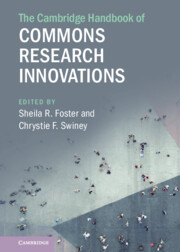Book contents
- The Cambridge Handbook of Commons Research Innovations
- The Cambridge Handbook of Commons Research Innovations
- Copyright page
- Contents
- Figures
- Tables
- Contributors
- Introduction
- Part I Revisiting the Origins and Evolution of Commons Thought
- Part II Averting New Tragedies
- Part III New Forms of Contested Commons
- Part IV Urban Landscape and Infrastructure as a Commons
- Part V Reassessing Old and New Institutions for Collective Action
- 13 Business Improvement Districts and the Urban Commons
- 14 To Have and To Hold? Community Land Trust as Commons
- 15 Ostromian Logic Applied to Civil Society Organizations and the Rules That Shape Them
- 16 A Conceptual Model of Polycentric Resource Governance in the 2030 District Energy Program
- Part VI Managing and Restoring the Commons
- Part VII Law, Legal Theory, and the Commons
- Part VIII Technology, the Internet, and the Future of Commons Governance
- Index
16 - A Conceptual Model of Polycentric Resource Governance in the 2030 District Energy Program
from Part V - Reassessing Old and New Institutions for Collective Action
Published online by Cambridge University Press: 29 October 2021
- The Cambridge Handbook of Commons Research Innovations
- The Cambridge Handbook of Commons Research Innovations
- Copyright page
- Contents
- Figures
- Tables
- Contributors
- Introduction
- Part I Revisiting the Origins and Evolution of Commons Thought
- Part II Averting New Tragedies
- Part III New Forms of Contested Commons
- Part IV Urban Landscape and Infrastructure as a Commons
- Part V Reassessing Old and New Institutions for Collective Action
- 13 Business Improvement Districts and the Urban Commons
- 14 To Have and To Hold? Community Land Trust as Commons
- 15 Ostromian Logic Applied to Civil Society Organizations and the Rules That Shape Them
- 16 A Conceptual Model of Polycentric Resource Governance in the 2030 District Energy Program
- Part VI Managing and Restoring the Commons
- Part VII Law, Legal Theory, and the Commons
- Part VIII Technology, the Internet, and the Future of Commons Governance
- Index
Summary
The 2030 District program encourages commercial building owners to make 50% cuts in building energy use, water use, and transportation emissions by 2030.Twenty cities across North America have joined to date.Participating cities agree to the overall goals but each city develops its own method for monitoring progress and encouraging compliance.I analyzed the 2030 Districts using the “club theory” of voluntary programs and the Institutional Analysis and Development framework.Club theory suggests that moderate standards and enforcement are more likely to attract participants and achieve the program’s goals than either strict or lenient approaches.Analysis of 2018 progress reports suggests that 2030 Districts have strict standards but low to moderate levels of monitoring and enforcement.Three districts already achieved the interim energy target of a 20% reduction in building energy use by 2020.One-third of districts submitted progress reports in 2018, suggesting that shirking could be a problem.Districts that failed to meet basic membership requirements were demoted to “emerging district” status.“Beyond compliance” programs like 2030 Districts can be important complements to climate change policies at local and national scales.
- Type
- Chapter
- Information
- The Cambridge Handbook of Commons Research Innovations , pp. 188 - 200Publisher: Cambridge University PressPrint publication year: 2021



